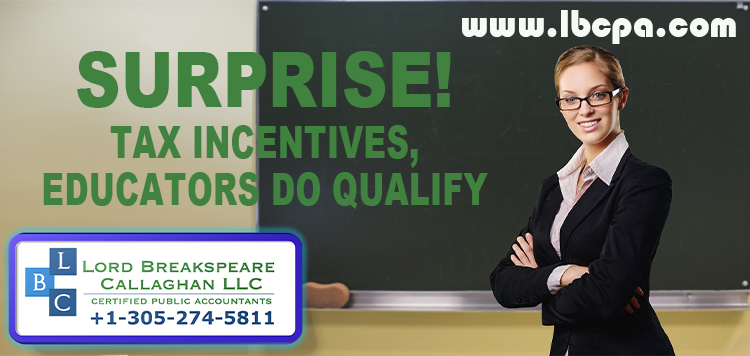LBCPA News 
Click here to go back
For the first time, maximum educator expense deduction rises to $300 in 2022; limit $250 for those filing 2021 tax returns

WASHINGTON — The Internal Revenue Service today reminded teachers and other educators planning ahead for 2022 that they'll be able to deduct up to $300 of out-of-pocket classroom expenses when they file their federal income tax return next year.
This is the first time the annual limit has increased since the special educator expense deduction was enacted in 2002. For tax-years 2002 through 2021, the limit was $250 per year. This means for people currently filing their 2021 tax returns due in April, the deduction is limited to $250. The limit will rise in $50 increments in future years based on inflation adjustments.
For 2022, an eligible educator can deduct up to $300 of qualifying expenses. If they are married and file a joint return with another eligible educator, the limit rises to $600. But in this situation, not more than $300 for each spouse.
Who qualifies?
Educators can claim this deduction, even if they take the standard deduction. Eligible educators include anyone who is a kindergarten through grade 12 teacher, instructor, counselor, principal or aide in a school for at least 900 hours during the school year. Both public- and private-school educators qualify.
What's deductible?
Educators can deduct the unreimbursed cost of:
- Books, supplies and other materials used in the classroom.
- Equipment, including computer equipment, software and services.
- COVID-19 protective items to stop the spread of the disease in the classroom. This includes face masks, disinfectant for use against COVID-19, hand soap, hand sanitizer, disposable gloves, tape, paint or chalk to guide social distancing, physical barriers, such as clear plexiglass, air purifiers and other items recommended by the Centers for Disease Control and Prevention (CDC).
- Professional development courses related to the curriculum they teach or the students they teach. For these expenses, it may be more beneficial to claim another educational tax benefit, especially the lifetime learning credit. For details, see Publication 970, Tax Benefits for Education, particularly Chapter 3.
Qualified expenses don't include expenses for home schooling or for nonathletic supplies for courses in health or physical education. As with all deductions and credits, the IRS reminds educators to keep good records, including receipts, cancelled checks and other documentation.
Reminder for 2021 tax returns being filed now: Deduction limit is $250
With the tax deadline just around the corner, the IRS reminds any educator still working on their 2021 return that they can claim any qualifying expenses on Schedule 1, Line 11. For 2021, the deduction limit is $250. If they are married and file a joint return with another eligible educator, the limit rises to $500. But in this situation, not more than $250 for each spouse.
Whether a return is self-prepared or prepared with the assistance of a tax professional or trained community volunteer, the IRS urges everyone to file electronically and choose direct deposit for any refund. For details, visit IRS.gov/efile.
In addition, the IRS urges anyone with tax due to choose the speed and convenience of paying electronically, such as with IRS Direct Pay, a free service available only on IRS.gov. For information about this and other payment options, visit IRS.gov/payments.
This year, the tax-filing deadline is:
- Monday, April 18 for most taxpayers.
- Tuesday, April 19 for residents of Maine and Massachusetts.
- Wednesday, June 15 for most Americans who live abroad.
If you have any questions regarding accounting, domestic taxation, essential business accounting, international taxation, IRS representation, U.S. tax implications of Real Estate transactions or financial statements, please give us a call at 305-274-5811
Source: IRS






